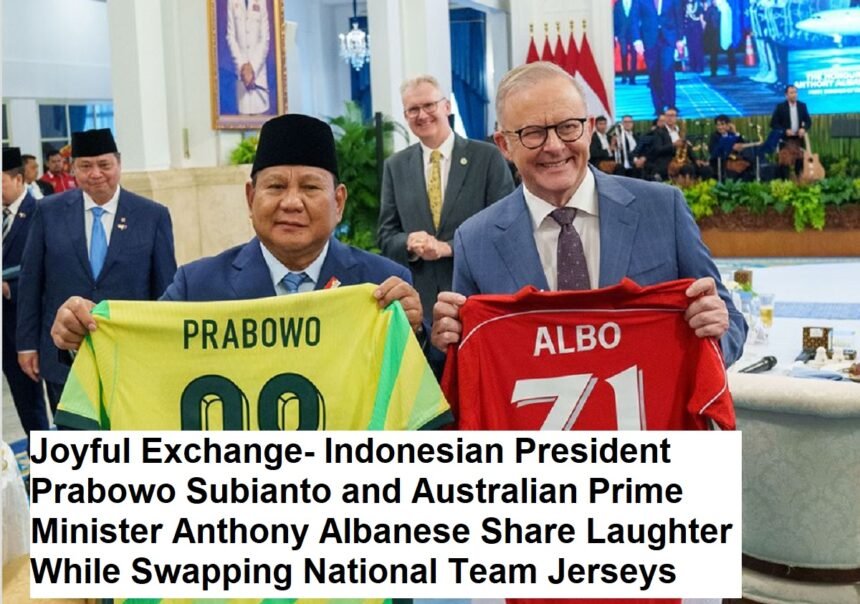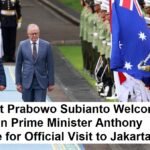During the official visit of Australian Prime Minister Anthony Albanese to Indonesia on May 15, 2025, a memorable and heartwarming moment captured public attention: the cheerful exchange of national football team jerseys between President Prabowo Subianto and Prime Minister Albanese. This lighthearted interaction, marked by genuine laughter and camaraderie, symbolized the strong and friendly ties between the two neighboring countries and highlighted the role of sports diplomacy in fostering international goodwill.
The jersey exchange took place at the Presidential Palace in Jakarta, where both leaders were engaged in high-level discussions on a range of bilateral and regional issues. Amidst the formalities, the moment of swapping jerseys brought a refreshing sense of warmth and personal connection, resonating with citizens and observers alike. The Indonesian national team jersey, proudly worn by President Prabowo, and the Australian national team jersey, donned by Prime Minister Albanese, represented more than just sports apparel—they embodied the spirit of cooperation, mutual respect, and shared aspirations between Indonesia and Australia.
Sports have long been recognized as a powerful tool for diplomacy, transcending political and cultural differences to build bridges between nations. In the context of Indonesia and Australia, football holds a special place as a popular sport that unites diverse communities and fosters friendly competition. The jersey exchange was a symbolic gesture that reinforced the importance of people-to-people connections alongside formal diplomatic relations.
The laughter and joy shared by the two leaders during the exchange reflected the positive atmosphere of the visit and the genuine rapport between them. It also served as a reminder that diplomacy is not only about negotiations and agreements but also about building trust and understanding through shared experiences and cultural exchanges.
This moment of sports diplomacy complemented the substantive discussions held during the visit, which covered key areas such as trade and investment, defense and security cooperation, climate change, and regional stability. Both leaders emphasized the importance of strengthening bilateral ties to address common challenges and seize opportunities for mutual benefit.
Trade and economic collaboration remain central to Indonesia-Australia relations, with both countries working to enhance market access, promote sustainable development, and encourage innovation. Defense and security cooperation continue to be vital in maintaining peace and stability in the Indo-Pacific region, with joint exercises, intelligence sharing, and capacity building forming the backbone of their partnership.
Climate change and environmental sustainability were also prominent topics, reflecting shared commitments to reduce carbon emissions, protect biodiversity, and transition to renewable energy sources. The leaders acknowledged that addressing these global challenges requires collaborative efforts and regional solidarity.
The jersey exchange, while symbolic, underscored the broader theme of partnership and friendship that defines Indonesia-Australia relations. It highlighted the role of cultural diplomacy in complementing political and economic ties, fostering goodwill among citizens, and promoting a positive image of cooperation.
Public reaction to the moment was overwhelmingly positive, with social media and news outlets sharing images and videos of the exchange, celebrating the warmth and humor displayed by both leaders. The gesture resonated with people across both countries, reinforcing a sense of shared identity and mutual respect.
In conclusion, the cheerful exchange of national team jerseys between President Prabowo Subianto and Prime Minister Anthony Albanese during the Australian leader’s visit to Jakarta on May 15, 2025, was a memorable highlight that captured the spirit of Indonesia-Australia friendship. Beyond the formal discussions and strategic cooperation, this moment of laughter and camaraderie showcased the power of sports diplomacy to strengthen bonds, build trust, and inspire hope for continued collaboration. As both nations look to the future, such gestures remind us that diplomacy is as much about human connection as it is about policy, paving the way for a more united and prosperous region.









